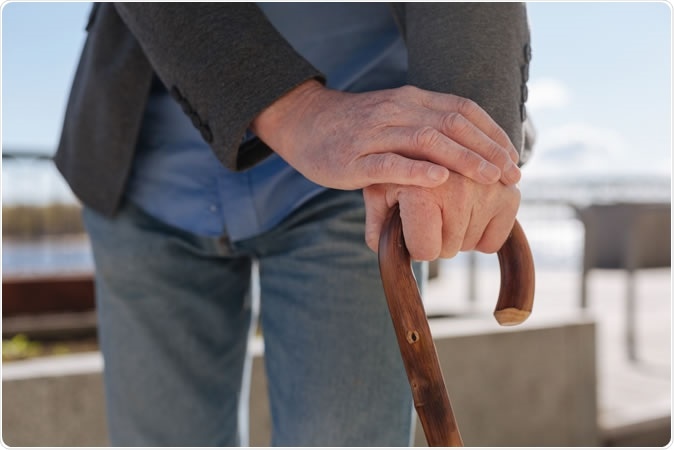Aging is an inevitable and a normal process of life. As people grow older, they lose muscle mass caused by age-related sarcopenia. In older adults, the maintenance of muscle mass and strength contribute to mobility which impacts quality of life. One of the reasons why older adults become frail is because of age-related muscle weakness.

Image Credit: Dmytro Zinkevych / Shutterstock
The mechanisms responsible for the changes would improve the understanding of their effects on health and how to prevent them from reducing the quality of life. Now, a new study shows that the nervous system plays an important role in age-related weakness.
Published in JAMA Network Open, the researchers showed and compared how much muscle strength older adults can meet voluntarily with how much force their muscles exert when they’re electrically stimulated. They found that age-related weakness is due to problems in brain and nerve function, instead of the changes that happen in the muscles.
The research reveals that muscle weakness during old age isn’t because of the muscles themselves, but because of some impairments in the brain and nerves, which are all included in the nervous system.
The researchers landed on their findings when they analyzed data from 66 older adults, with a mean age of 70 years old. They were grouped into weak, modestly weak, and strong, based on a standardized test to measure their physical strength.
In the physical test, the team of researchers asked the participants to push force against resistance with their leg extensor muscles, with all the effort and strength they could exert. Once they reached their limit, the researchers electrically stimulated the muscle they used during the test. If the muscle will put more force, it means that the strength limitation of the person had, came from somewhere else, rather than the muscle.
“If force goes up (when the stimulation is applied), that lets us know that there's some deficit or impairment to the nervous system's ability to activate the muscle," Brian Clark, professor of physiology and neuroscience, said.
The researchers also found that the weaker, the older adults, the larger a boost the muscles had, and those in the severely weak group had an increase of about 14.2 percent, which is twice the 7.2 percent increase seen in people in the strong group.
“Weakness in older adults is conceptualized by many as a disorder of skeletal muscle. However, this work presents evidence indicating that weak older adults have significant deficits in their nervous systems’ ability to fully activate their leg extensor muscles,” the researchers wrote in the study.
There are multiple locations in the neuromuscular pathway that could account for the deficits that were observed. For instance, this deficit could be due to suboptimal descending drive due to neurophysiological and motivational factors, the motor neurons themselves not optimally responding to the descending drive, or other factors,” they added.
The data do not hint an underlying mechanism, the information gathered by the researchers can suggest that medical treatments that target the nervous system, can be used to improve muscle strength, especially in older adults.
What is an age-related weakness?
Weakness in older adults or sarcopenia can lead to many complications and can dramatically impact their quality of life. Sarcopenia is a condition tied to the aging process. It usually affects one’s muscle mass and strength, which leads to problems with gait, balance, and overall ability to perform activities of daily living.
The symptoms of sarcopenia include loss of stamina and weakness, which can interfere with physical activity. With decreased activity, the muscles will shrink and can lead to a multitude of problems.
Though sarcopenia is seen mostly in older adults who are less active or inactive, it can occur in people who are active. This can suggest other problems such as a decrease in nerve cells, responsible for sending messages to the brain and the muscles of movement, reduced ability to turn proteins into energy, decreased concentrations of hormones, and not getting enough activity.
Journal reference:
Clark BC, Manini TM, Wages NP, Simon JE, Clark LA. Voluntary vs Electrically Stimulated Activation in Age-Related Muscle Weakness. JAMA Netw Open. Published online September 25, 20192(9):e1912052. doi:10.1001/jamanetworkopen.2019.12052, https://jamanetwork.com/journals/jamanetworkopen/fullarticle/2751891?resultClick=1